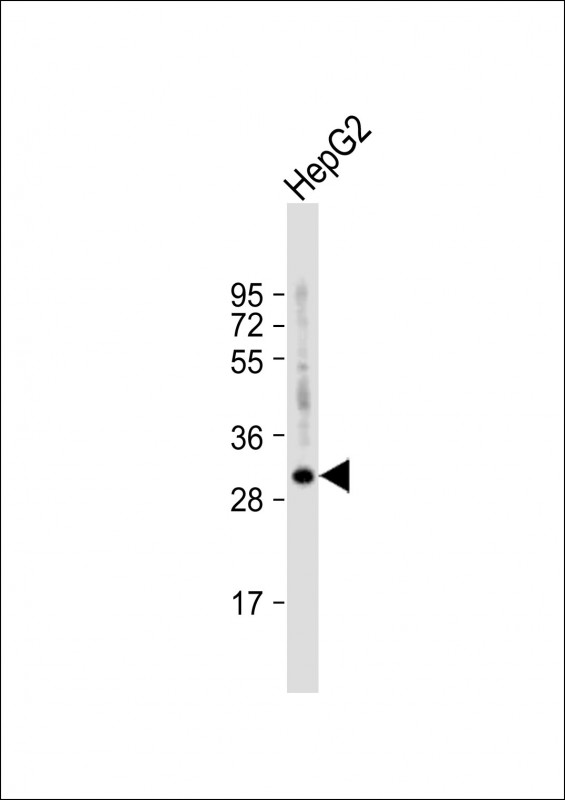TOLLIP Antibody (C-term)
Affinity Purified Rabbit Polyclonal Antibody (Pab)
- SPECIFICATION
- CITATIONS
- PROTOCOLS
- BACKGROUND

Application
| WB, E |
|---|---|
| Primary Accession | Q9H0E2 |
| Other Accession | A2RUW1, Q9QZ06, NP_061882.2 |
| Reactivity | Human |
| Predicted | Mouse, Rat |
| Host | Rabbit |
| Clonality | Polyclonal |
| Isotype | Rabbit IgG |
| Calculated MW | 30282 Da |
| Antigen Region | 236-265 aa |
| Gene ID | 54472 |
|---|---|
| Other Names | Toll-interacting protein, TOLLIP |
| Target/Specificity | This TOLLIP antibody is generated from rabbits immunized with a KLH conjugated synthetic peptide between 236-265 amino acids from the C-terminal region of human TOLLIP. |
| Dilution | WB~~1:1000 E~~Use at an assay dependent concentration. |
| Format | Purified polyclonal antibody supplied in PBS with 0.09% (W/V) sodium azide. This antibody is purified through a protein A column, followed by peptide affinity purification. |
| Storage | Maintain refrigerated at 2-8°C for up to 2 weeks. For long term storage store at -20°C in small aliquots to prevent freeze-thaw cycles. |
| Precautions | TOLLIP Antibody (C-term) is for research use only and not for use in diagnostic or therapeutic procedures. |
| Name | TOLLIP |
|---|---|
| Function | Component of the signaling pathway of IL-1 and Toll-like receptors (PubMed:10854325, PubMed:11751856). Inhibits cell activation by microbial products. Recruits IRAK1 to the IL-1 receptor complex (PubMed:10854325). Inhibits IRAK1 phosphorylation and kinase activity (PubMed:11751856). Connects the ubiquitin pathway to autophagy by functioning as a ubiquitin-ATG8 family adapter and thus mediating autophagic clearance of ubiquitin conjugates (PubMed:25042851). The TOLLIP-dependent selective autophagy pathway plays an important role in clearance of cytotoxic polyQ proteins aggregates (PubMed:25042851). In a complex with TOM1, recruits ubiquitin-conjugated proteins onto early endosomes (PubMed:15047686). Binds to phosphatidylinositol 3-phosphate (PtdIns(3)P) (PubMed:26320582). |
| Cellular Location | Cytoplasm. Endosome. Early endosome Note=Localized to endo/exosomal vesicles |

Thousands of laboratories across the world have published research that depended on the performance of antibodies from Abcepta to advance their research. Check out links to articles that cite our products in major peer-reviewed journals, organized by research category.
info@abcepta.com, and receive a free "I Love Antibodies" mug.
Provided below are standard protocols that you may find useful for product applications.
Background
This gene encodes a ubiquitin-binding protein that interacts with several Toll-like receptor (TLR) signaling cascade components. The encoded protein regulates inflammatory signaling and is involved in interleukin-1 receptor trafficking and in the turnover of IL1R-associated kinase.
References
Han, S., et al. Hum. Immunol. 71(7):727-730(2010)
Rajaraman, P., et al. Cancer Epidemiol. Biomarkers Prev. 19(5):1356-1361(2010)
Davila, S., et al. Genes Immun. 11(3):232-238(2010)
Yoshida, T., et al. Int. J. Mol. Med. 25(4):649-656(2010)
Oguri, M., et al. Am. J. Hypertens. 23(1):70-77(2010)
If you have used an Abcepta product and would like to share how it has performed, please click on the "Submit Review" button and provide the requested information. Our staff will examine and post your review and contact you if needed.
If you have any additional inquiries please email technical services at tech@abcepta.com.













 Foundational characteristics of cancer include proliferation, angiogenesis, migration, evasion of apoptosis, and cellular immortality. Find key markers for these cellular processes and antibodies to detect them.
Foundational characteristics of cancer include proliferation, angiogenesis, migration, evasion of apoptosis, and cellular immortality. Find key markers for these cellular processes and antibodies to detect them. The SUMOplot™ Analysis Program predicts and scores sumoylation sites in your protein. SUMOylation is a post-translational modification involved in various cellular processes, such as nuclear-cytosolic transport, transcriptional regulation, apoptosis, protein stability, response to stress, and progression through the cell cycle.
The SUMOplot™ Analysis Program predicts and scores sumoylation sites in your protein. SUMOylation is a post-translational modification involved in various cellular processes, such as nuclear-cytosolic transport, transcriptional regulation, apoptosis, protein stability, response to stress, and progression through the cell cycle. The Autophagy Receptor Motif Plotter predicts and scores autophagy receptor binding sites in your protein. Identifying proteins connected to this pathway is critical to understanding the role of autophagy in physiological as well as pathological processes such as development, differentiation, neurodegenerative diseases, stress, infection, and cancer.
The Autophagy Receptor Motif Plotter predicts and scores autophagy receptor binding sites in your protein. Identifying proteins connected to this pathway is critical to understanding the role of autophagy in physiological as well as pathological processes such as development, differentiation, neurodegenerative diseases, stress, infection, and cancer.



